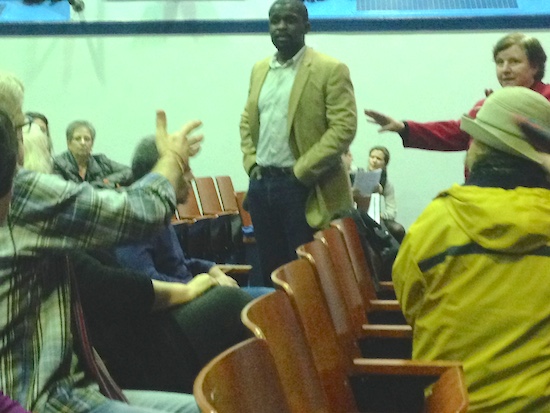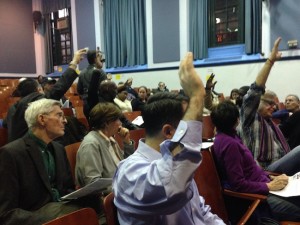The NYC Veterans Alliance was featured in the West Side Rag blog post listed below, written by Jessica Brockington:

Army veteran Samuel Innocent, a member of Mayor de Blasio’s Veterans’ Advisory Board, spoke at a meeting Thursday night on housing for veterans.
By Jessica Brockington
An oral agreement has been reached between the owner of 330 W. 95th Street and NYC’s Human Resources Administration, transitioning the building from a homeless shelter and SRO into permanent affordable SROs for veterans, residents of the area were told on Thursday evening at a public information session organized by Community Board 7 at PS 75.
The meeting juxtaposed neighbors and community activists, angry that another social service was being dropped in an area supersaturated with shelters and SROs, with veterans and advocates eager to support President Obama’s 2010 Call to Action to find housing for every veteran.
The final agreement for 330 W. 95th Street is expected to be signed in a matter of days, according to Daniel Tietz, Chief Special Services Officer, HRA, Department of Social Services, with as many as 20 veterans moving into the building before the end of the year, and a total of 135 housed within the first few months of 2016. Tenants in the other 57 SRO units, which are rent stabilized, will continue to reside in the building.
 If all goes as planned, Bailey House and Harlem United, both organizations with backgrounds in community-based care and housing for people living with HIV/AIDS, will hold master leases with the owner of the building, and administer security and support services to the veterans. According to the CEOs of those organizations, Gina Quattrochi and Jacqui Kilmer, respectively, 40 veterans have been interviewed so far.
If all goes as planned, Bailey House and Harlem United, both organizations with backgrounds in community-based care and housing for people living with HIV/AIDS, will hold master leases with the owner of the building, and administer security and support services to the veterans. According to the CEOs of those organizations, Gina Quattrochi and Jacqui Kilmer, respectively, 40 veterans have been interviewed so far.
Before engaging questions from angry area residents, Lincoln Restler, Senior Policy Advisor for the de Blasio administration, introduced Loree Sutton, a retired U.S. Army brigadier general and psychiatrist, and Commissioner of the Mayor’s Office of Veterans’ Affairs.
“We hope to make things better for veterans in a way that has never happened before,” Sutton told the crowd. She introduced experts she had brought with her from the supportive housing network, Harlem Vet Center, NYC Veterans Alliance, and Veterans’ Advisory Board.
Samuel Innocent, a member of the mayor’s Veterans’ Advisory Board said “When I first came back I was living in a studio with three other veterans.” He said the message to the residents from the community should be “I care about you, and thank you.”
Larry Dugan, a Navy veteran who has lived in the neighborhood since 1982, asked how NYC could answer the call to find housing for every veteran with an SRO. “As a veteran, I think you can do better. I really do!”
He cited Urban Pathways in the Bronx as an example of other possibilities. “They deserve at least a one-bedroom, not an SRO sharing a bathroom and kitchen.”
But residents are also angry about lack of communication from the HRA and the time frame, and they have raised questions about the stability of the incoming population. “How many mentally ill and drug addicted are you going to give us?” asked one woman.
Tietz emphasized that the veterans being interviewed do not have serious and persistent illness. “These are not people with serious issues,” he said. “Do they have challenges unique to veterans? They may well, but we are going to offer services that meet those challenges.”
Walter Bridgers, a social worker at the Harlem Vet Center, and retired team leader from the US Army, shared his concern for the community.
“I lived on 96th Street in the early 70’s. I understand your complaints about SROs in this community,” he said.
“There was an open door policy and they took long-term, mentally ill patients, put them on psychotropic drugs. This area became saturated with those kinds of issues. The supportive services were not there and this community paid for that – a heavy price.”
“This is not the same. These are people who have served this country. They’re not the same individuals who came into your community 20, 30 years ago,” he said.
Kristen Rouse, of NYC Veterans Alliance, made an impassioned plea to give the veterans the support they need and deserve.
“I served three tours in Afghanistan. I advocate for veterans. I’m not here to support the administration. I’m here to support veterans. Please embrace veterans just like me. Please embrace us; we make good neighbors. These units are a lot better than the barracks I lived in in Fort Knox. We’ve lived in some dumps in Afghanistan,” she said.
“Veterans are choosing to take the vouchers they have and money they have earned, to choose this. I call bullshit on the Administration all the time, but embrace us.”
Residents were also concerned about the ongoing litigation between the building owner and the city and demanded a capital expenditure plan, and floor plans.
Tietz indicated that city engineers have walked through the building and residents will be moved in as renovations to kitchens, in particular, can be made. The building owner’s litigation was a motivating factor in securing this agreement, he said, since the master leases with Bailey House and Harlem United will add a layer of oversight in an historically troubled location.
While there will not be criminal background checks on the veterans, he told the crowd, they will be run against national sex crime registries. Generally, the vets will be in relatively good shape, need a little assistance and support. “Folks with complex needs would not be suitable for this location.”
Borough President Gale Brewer showed up in support of the project. “We don’t like the owner or the [current] manager of the building, but we do want the veterans. The issue is how do we do it right.” She is also worried about the financial deal the City has cut.
Council member Helen Rosenthal said the units will rent for slightly more than what the landlord would be getting from a rent stabilized tenant. It will be a permanent fixed number for the next 10 years and is “exactly what was asked for.”
A community advisory board for the project will be set up as soon as the agreement is signed. According to Martha Calhoun, General Counsel, HRA, that should happen in the next few days.
